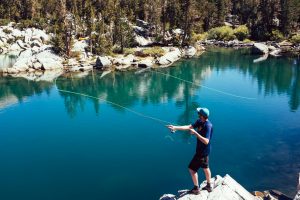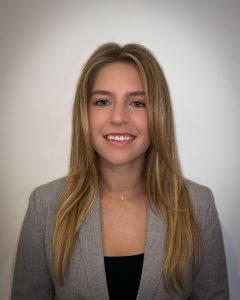Getting Hooked on IP
Given my STEM background, once I shared my interest in law school, people frequently suggested intellectual property (IP) as a career path. At the time, I didn’t personally know any lawyers, but I was eager to explore this potential career path. A family friend connected me with a partner at Greer, Burns & Crain (“GBC”), who invited me to shadow an associate for a day.
That day was eye-opening. When I arrived, the associate provided a crash course in trademark infringement and explained the proceedings we would observe at the courthouse. She described how the firm represented clients who produce luxury goods with recognizable logos and pattern designs. These logos were registered trademarks of the companies GBC represented, meaning they were symbols of the parent company that had been officially recorded with the United States Patent and Trademark Office (USPTO) and could not be used by another for luxury goods without permission. I learned how these trademarks are often targeted by counterfeiters, particularly overseas manufacturers. Seeing the legal mechanisms available to protect such creative works was fascinating. I had seen knock-off designer goods before and knew about the counterfeit market. However, I never thought about how the legal rights of the designers stop others from improperly copying their work and penalizing their conduct.
As we walked briskly to the Federal Courthouse, the associate outlined how GBC’s clients had filed motions to compel with the court requesting the other side participate in “discovery.” This is the phase of litigation when both sides exchange information to ensure each side can obtain evidence for their case before trial. Watching litigation unfold in real-time was thrilling, especially when I realized that IP law protects not just engineering inventions but a variety of creations. This experience ignited my passion for litigation and gave me a glimpse of the tangible impact of legal advocacy in the IP field.
Reeling in the Line
Shadowing the GBC associate introduced me to the expansive world of IP law.This prompted me to dig deeper. Through independent research, I discovered the breadth of IP and how it could enable me to work on matters that intersected with my scientific background.
When I began searching for a new job after college, I was ecstatic to find a position as a legal assistant supporting attorneys who specialized in IP. I reeled in every opportunity to expand my knowledge, assisting on patent infringement cases, where one company sues another for violating their patent rights. In these cases, I assisted attorneys in drafting cease and desist letters that requested the recipients stop their conduct which infringed on our client’s patent rights.
As I continued to get more involved with the IP practice, I was fascinated by the intersection of scientific innovation and legal protection. My academic background gave me an edge in understanding the highly technical details behind inventions, particularly in the biotechnology and pharmaceutical spaces. This unique synergy between hard science and the law solidified my decision to pursue IP litigation. When I left my law firm role to start law school, I did so with a clear plan to focus on intellectual property. While I didn’t know what type of IP interested me most, I knew I wanted to be involved and that I would learn more about it in law school.
Snagged My Lure in Several Trees
Upon arriving at Loyola, my once fervent passion for IP was momentarily clouded. The exposure to so many fascinating areas of law made me second guess my initial choice. I began attending events in other areas of law, snagging my lure in every tree I found interesting. I attended the Antitrust Fellows lunches, as well as the Symposium for Health Care Law and Policy. I began networking in these areas and meeting with practicing attorneys to better understand their work.
Initially, I thought I might close the door on IP, but my exploration revealed that these areas were not ideal fits for my long-term career goals. I quickly discovered that most antitrust work is largely anchored in D.C., and I had zero interest in moving. After speaking with health law attorneys, I concluded that I wanted a broader practice than pharmaceuticals, and it felt too focused on regulation. While I found those legal issues interesting (and I still do!), these experiences ultimately reaffirmed my interest in IP, and I returned to exploring it with renewed enthusiasm.
Ready to Cast Again
Reengaging with IP at Loyola made me realize that it was the right path all along. I began attending IP events to see what others had to say.

Attorneys I spoke with at the a law student event hosted by the Chicago Bar Association’s Young Lawyers Section encouraged me to explore IP deeper. Attorneys in all areas of IP, including patents and trademarks, emphasized the dynamic nature of IP law and how it constantly evolves to keep pace with technological advancements. This sentiment is even more true today with new software and smart phone applications, influencers, and pharmaceutical drugs constantly emerging.
I found that my scientific background provided unique insights into the legal challenges of protecting scientific innovations, and I was eager to explore these issues further.
Attending IP events at Loyola allowed me to learn about the different niches within the field and refine my understanding of the type of work I wanted to pursue.
Seeking Advice from Loyola’s Expert Anglers
After happily casting and recasting my line many times, my passion for IP was reinvigorated. Every lawyer I spoke to at networking events fervently vocalized the high degree of satisfaction they had towards their career in IP. They attributed their satisfaction to professional development, mentorship, and work-life balance. Additionally, Loyola graduates practinging IP expressed their satisfaction with the opportunities afforded to them because of Loyola’s Intellectual Property program and the extensive support of its network. After dipping my toes in the IP pool, I couldn’t agree more.
At the IP Alumni Reception, I found Loyola alumni were more than happy to help answer questions and share personal anecdotes. There, attorneys shared with me how their firms structure their IP practice between litigation and patent prosecution (helping inventors secure rights for their work), but also patents versus trademarks. I was especially interested in this topic since I did not want to be confined to one area of IP, especially before I fully understood them all.
I also attended a Speed Networking event hosted by Professor Ho and IPLAC (Intellectual Property Law Association of Chicago). There, attorneys shared their perspectives on career planning, including what factors were important when selecting a firm. Some factors I wouldn’t have known to consider before my invaluable conversations included the breadth versus depth of an IP practice, opportunities for work across practice groups, and industry of the firm’s IP clients.
This was vital information to me as I sought out internship opportunities and began to think critically about the type of firm I wanted to work at long term.
I am grateful for the experiences Loyola offered me as a 1L exploring IP. Now as a 2L, I am thrilled to share that I secured a Summer Associate position at Vedder Price with their IP team for 2025. I am incredibly thankful for the opportunities Loyola has provided me to explore my passion for IP, and excited to continue developing my skills and knowledge in this dynamic and rewarding field.

Taylor Lores
Associate Blogger
Loyola University Chicago School of Law, J.D. 2026
